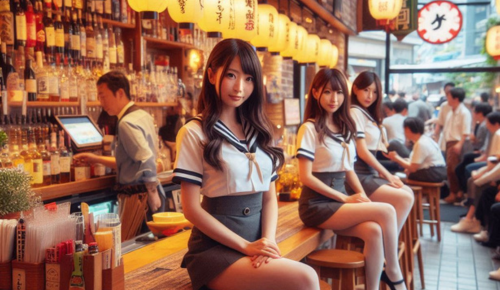The host bar is a unique entertainment culture that originated in Japan, where attractive male hosts provide services to female customers. These hosts drink with customers, engage in conversations, and create intimate experiences tailored to their preferences. This culture has a long history in Japan and has particularly thrived in entertainment districts like Kabukicho in Tokyo.
In Korea, the concept of host bars was almost non-existent in the past. However, in recent years, they have become more well-known and increasingly popular among some women. Traditionally, nightlife establishments catered mostly to male customers, such as room salons, karaoke bars, and entertainment pubs. However, as women’s social status and economic power have grown, nightlife culture has started to shift. The rise of host bars, where women pay for male companionship, symbolizes this societal transformation.
What Is the Host Bar Culture in Japan?
Host bars began to flourish in Japan in the late 1960s, coinciding with the period when women started gaining more financial independence and had greater control over their spending. Women who visit host bars in Japan generally fall into the following categories:
- Socially Successful Women – Businesswomen, celebrities, lawyers, and other financially independent women often visit host bars to escape their busy lives and enjoy male attention in a relaxing environment.
- Women in the Entertainment Industry – A significant portion of host bar customers are women working in the nightlife industry. After spending their days catering to male clients, they seek emotional comfort and companionship at host bars in return.
- Curious Visitors – Host bars are widely portrayed in Japanese media, attracting women who visit out of sheer curiosity to experience the unique atmosphere.
At host bars, the experience is not just about drinking; hosts create an illusion of romance and emotional connection. They shower customers with compliments, engage in meaningful conversations, and cater to their emotional needs. Because of this, some customers become deeply attached to specific hosts and spend significant amounts of money on them.
Do Host Bars Exist in Korea?
Although host bars have existed in Korea for some time, they have only recently gained widespread recognition. As in Japan, the rise of host bars in Korea reflects the increasing economic independence and social status of women. Traditionally, Korean nightlife establishments have primarily served men, with venues such as room salons, high-end karaoke clubs, and private bars. In contrast, women had fewer options to enjoy similar entertainment.
Men in Korea have long frequented establishments where female hostesses accompany them for drinks and conversation. However, with the rise of ladies’ bars and host bars, the balance in the entertainment industry is shifting.
The format of host bars in Korea differs slightly from that in Japan. While Japanese host bars focus heavily on crafting a romantic fantasy for customers, Korean host bars tend to maintain a more casual drinking atmosphere. Nevertheless, the fundamental concept remains the same: male hosts cater to female clients’ desires, offering companionship, conversation, and flattery.
Does the Existence of Host Bars Signify an Improvement in Women’s Social Status?
The emergence of host bars can be seen as evidence that women’s social and economic status has improved. In the past, men were the primary consumers of nightlife entertainment, but now women, too, have the financial power to choose how they spend their money.
The fact that women can now participate in nightlife in ways previously reserved for men reflects broader societal changes. No longer confined to traditional gender roles, women can now seek pleasure, relaxation, and emotional support on their own terms.
However, some critics argue that host bars also come with negative consequences. Some women become emotionally dependent on hosts, leading them to spend excessive amounts of money. Additionally, as host bars are still part of the entertainment industry, they may give rise to the same social issues commonly associated with male-dominated nightlife establishments.
Conclusion
Japanese host bars provide women with a space where they can receive emotional and social services from male hosts. In Korea, similar establishments are slowly gaining popularity, reflecting women’s growing financial power and shifting social roles.
In the past, nightlife culture revolved around men, but today, women have the freedom to choose their entertainment options. While the rise of host bars can be interpreted as a sign of progress, it is not without its downsides. Just as male-oriented nightlife establishments have faced criticism for promoting excessive spending and unhealthy attachments, host bars also raise similar concerns.
Ultimately, while host bars do not solely represent the advancement of women’s social status, they do indicate a shift in societal norms. Women are no longer passive participants in social interactions—they have the autonomy to seek their own forms of entertainment and companionship. As society continues to evolve, it will be interesting to see how nightlife culture adapts and progresses in a way that benefits all individuals.
For more information about host bars in Korea, you can visit 강남호빠

